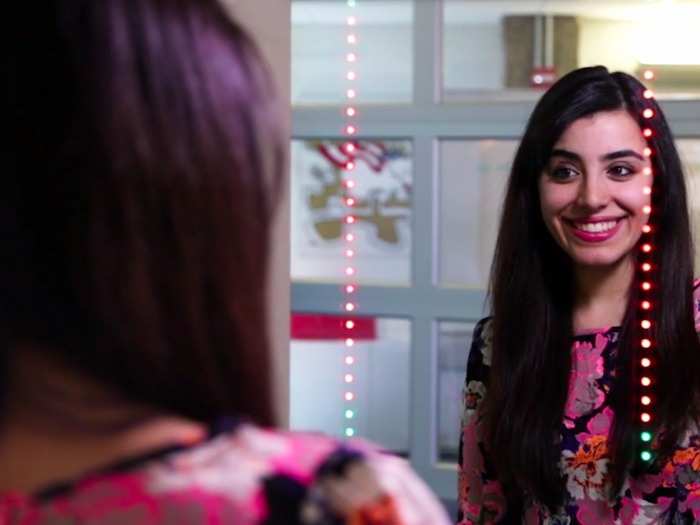
Claim your success before you begin, Price says.
"Let's learn from the experts in sports psychology. They've proven that an athlete's positive self-talk prior to and during a performance consistently creates a higher win rate," she explains.
In the minutes leading up to your presentation, say over and over within yourself, "I am a dynamic speaker!" "I am enthusiastic and engaging!" "I am prepared and confident!"
"Write your own set of self-affirmations and confidently declare them," she advises. "Your words will create a self-fulling prophecy."

"First thing's first," Price says. "Needing the toilet when you wouldn't normally 'have to go' is a common reaction to anxiety and pre-speech jitters. Why take chances? Plan ahead and use the restroom in the moments prior to going on stage."

Shake hands and talk with as many people as possible ahead of time. "This shows the audience you're approachable and personable," Price explains.
"You may even learn a few names, issues, and stories to weave into your presentation. Plus, having conversations with your listeners ahead of time transforms scary 'public' speaking into natural, relaxed 'personal' speaking."

As the speaker, be sure you know the environment, including the seating arrangement, presentation electronics, microphone, and lighting.
Get to the room early and ensure you're comfortable with the set-up. "This step shows the audience you're prepared and helps ensure your presentation runs smoothly," she says.

Since anxiety tightens the muscles in the chest and throat, it's important to diminish that restricting effect with deep inhalations, Price explains.
Don't underestimate the power of a long, slow, deep breath. "It maximizes the amount of oxygen that flows to the lungs and brain; interrupts the adrenalin-pumping 'fight or flight' response; and triggers the body's normal relaxation response," she says. In the moments leading up to your presentation, breathe deeply and deliberately.

Whatever you're planning to say as the captivating opener — a witty quotation, personal story, or startling statistic — rehearse the first few sentences several times, Price suggests. Knowing exactly how you're going to start gives you confidence, enables you to look directly into the eyes of audience members as you begin (not at notes or a slide), and creates a powerful first impression.

"Harnessing the power of the mind-body connection means that you can learn to use your thoughts to positively influence your body's physical responses," Price says.
As a result, you can decrease stress and increase a sense of wellbeing and control, just by holding positive thoughts and images in your mind.
For example, replace the thought, "I'm so nervous and unprepared I'm going to bomb," with a positive statement such as, "I'm an expert on my topic," "I'm enthusiastic and engaging," or, "I'm credible and confident."

"This helps with dry-mouth, cuts through mucus buildup in the mouth, and clears the throat," Price says. Avoid cold food and drinks, dairy products, and carbonated beverages — and ensure a glass or bottle of water is within arm's reach during your speech.

Prior to speaking, tell yourself:
"This audience believes I am the expert." The audience perceives you as a recognized authority simply because you're the one speaking, she explains. "Plus, you know more than they do about the topic."
"They want me to succeed." Audiences are rooting for you. They want and expect you to add value; to be interesting, engaging, and informative otherwise the presentation is a waste of their time, says Price.
"They don't know what I'm going to say." If you make an error, don't announce it or apologize, just keep going. "The audience will never know."

In a private setting beforehand, do some light stretching, a few knee-bends, or take a brisk walk down the hall and back. "This rids the body of excess energy and sends oxygen to the brain," she says.

If you're the host or only speaker, you'll be standing anyway. However, if you're one of several speakers on the agenda, and your turn is coming up in five minutes, simply step to the back of the room and stand, or stand up if you're backstage.
"The sitting position is motionless, passive, and inactive. By standing, you summon energy ahead of time, give your body a chance to warm up, and place yourself in a posture ready for action."

Did you get overwhelmingly nervous the last time you gave a birthday gift to a friend? Probably not. You may have felt anticipation, excitement, even joy, but not anxiety, Price says.
"As a speaker, think about your presentation as a gift to the audience; a nicely wrapped package full of valuable information, helpful ideas and meaningful content. The mental attitude of giving empowers you and frees you. It takes your mind off of yourself and puts the focus on helping others."

Maintain a positive, pleasant expression on your face in the moments before you speak.
"Smiling actually relaxes the body. Physiologically, smiling emits endorphins in the brain that calms the nerves, creates a pleasant attitude, and promotes a sense of wellbeing," she says.
Plus, a smile conveys confidence and self-assurance. It shows your audience that you're happy to see them and enthusiastic about your message.
 Ghost shopping malls surged 59% in 2023, 16 retail centres shut across top cities
Ghost shopping malls surged 59% in 2023, 16 retail centres shut across top cities
 Top-selling cars in India in April 2024 – Tata Punch continues to dominate
Top-selling cars in India in April 2024 – Tata Punch continues to dominate
 Apple Let Loose event today – What to expect, where to watch the live stream and everything you need to know
Apple Let Loose event today – What to expect, where to watch the live stream and everything you need to know

Copyright © 2024. Times Internet Limited. All rights reserved.For reprint rights. Times Syndication Service.